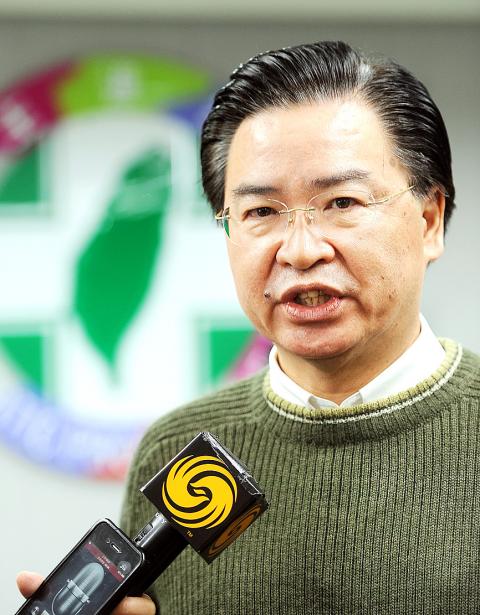Heated debate is expected in a Democratic Progressive Party (DPP) meeting tomorrow, despite it having been scheduled as an occasion for the party to finalize and unveil its “new and improved” China policy, with DPP members still arguing about the independence clause and the party’s stance on facilitating cross-strait exchanges.
The moderate wing of the party, led by former premier Frank Hsieh (謝長廷), published articles on various platforms ahead of tomorrow’s meeting — the finale of a series of seminars and expanded meetings held in the past seven months — to criticize the party’s “conservative stance” in the draft report.
The meeting drew even more attention from DPP members and political observers after DPP caucus convener Ker Chien-ming (柯建銘) proposed freezing the party’s Taiwan independence clause to reduce tensions between Beijing and the DPP, and to facilitate bilateral dialogue.

Photo: Fang Pin-chao, Taipei Times
Hsieh, who advocated “two sides, two constitutions (兩岸兩憲)” as the foundation of bilateral engagement, said in an op-ed piece published by the Chinese-language United Daily News yesterday that his initiative had been revised to the “constitutionalism consensus,” which is vastly different from his proposal.
The former premier urged the DPP to “review, integrate and summarize” the three resolutions on Taiwan’s political status — the independence clause written in 1991, the resolution on Taiwan’s future in 1999 and the resolution on a normal country in 2007 — and unify the party’s position on the highly contentuous issue.
Former DPP legislator Julian Kuo (郭正亮) lambasted the draft report, which was sent to DPP politicians for final review, saying that DPP Chairman Su Tseng-chang’s (蘇貞昌) China policy “was more conservative and unrealistic than [that of] former DPP chairperson Tsai Ing-wen (蔡英文).”
Su’s position on China was based on the 1999 resolution on Taiwan’s future, which was a “cliche,” Kuo said, adding that the DPP under Su’s leadership has been “passive” about cross-strait engagement and highlighted political confrontation.
Kuo described as “unfeasible” the DPP’s provisional conclusion of its new China policy that stressed support of human rights, freedom and a democratic movement in China, and advocated a “value-based diplomacy.”
“From what I’ve seen, the DPP still has not found the solution to replace the Chinese Nationalist Party’s [KMT] so-called ‘1992 Consensus,’ which has been accepted by Beijing as the foundation for bilateral exchanges,” Kuo said.
Responding to the criticism, the DPP’s Policy Research Committee executive director Joseph Wu (吳釗燮) said that the draft report was a summary of the consensus of previous meetings and could be revised again, if that was the consensus of those who would attend the meeting.
“We still think that freezing the independence clause is not an issue, because Taiwan is already a sovereign and independent country,” he said, adding that he was unsure if Ker would again propose freezing the clause.
Meanwhile, National Chengchi University professor Tung Cheng-yuan (童振源) and former Straits Exchange Foundation president Hung Chi-chang (洪奇昌) reportedly will announce a three-point initiative on the DPP’s China policy, which would propose freezing the independence clause and passage of a resolution that recognizes the Republic of China (ROC); establishing a non-partisan committee to promote peaceful development across the Taiwan Strait; and endorsing Hsieh’s “two sides, two constitutions” proposal.

The Grand Hotel Taipei on Saturday confirmed that its information system had been illegally accessed and expressed its deepest apologies for the concern it has caused its customers, adding that the issue is being investigated by the Ministry of Justice Investigation Bureau. The hotel said that on Tuesday last week, it had discovered an external illegal intrusion into its information system. An initial digital forensic investigation confirmed that parts of the system had been accessed, it said, adding that the possibility that some customer data were stolen and leaked could not be ruled out. The actual scope and content of the affected data

DO THEY BITE IT? Cats have better memories than people might think, but their motivation is based entirely around the chance of getting fed Cats can remember the identity of the people who fed them the day before, Taipei-based veterinarians said on Friday, debunking a popular myth that cats have a short memory. If a stray does not recognize the person who fed them the previous day, it is likely because they are not carrying food and the cat has no reason to recognize them, said Wu Chou Animal Hospital head Chen Chen-huan (陳震寰). “When cats come to a human bearing food, it is coming for the food, not the person,” he said. “The food is the key.” Since the cat’s attention is on the food, it

‘LIKE-MINDED PARTNER’: Tako van Popta said it would be inappropriate to delay signing the deal with Taiwan because of China, adding he would promote the issue Canadian senators have stressed Taiwan’s importance for international trade and expressed enthusiasm for ensuring the Taiwan-Canada trade cooperation framework agreement is implemented this year. Representative to Canada Harry Tseng (曾厚仁) in an interview with the Central News Agency (CNA) said he was increasingly uneasy about Ottawa’s delays in signing the agreement, especially as Ottawa has warmed toward Beijing. There are “no negotiations left. Not only [is it] initialed, we have three versions of the text ready: English, French and Mandarin,” Tseng said. “That tells you how close we are to the final signature.” Tseng said that he hoped Canadian Prime Minister Mark Carney

President William Lai (賴清德) yesterday bestowed one of Taiwan’s highest honors on Saint Vincent and the Grenadines (SVG) Ambassador Andrea Clare Bowman in recognition of her contributions to bilateral ties. “By conferring the Order of Brilliant Star with Grand Cordon on Ambassador Bowman today, I want to sincerely thank her, on behalf of the Taiwanese people, for her outstanding contribution to deepening diplomatic ties between Taiwan and SVG,” Lai said at a ceremony held at the Presidential Office in Taipei. He noted that Bowman became SVG’s first ambassador to Taiwan in 2019 and